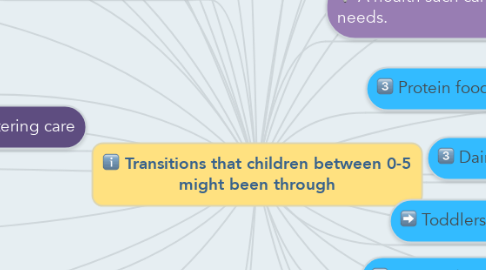Transitions that children between 0-5 might been through
by Joyce Tang

1. Changing in family structure
2. Bullying or abuse
3. Bereavement
4. Adaptation
5. Children with intellectual disability may be at heightened risk for early school difficulties, in part due to their deficits in cognitive and adaptive behaviours
6. Move from pre-school to foundation stage
7. Transitions within classes
8. Moving through year groups
9. Nursery to school
10. Movement around friends
11. Changing friends
12. New step parents
13. Separation from parents
14. Entering care
15. Death of family member
16. New siblings
17. Divorce or separation of parents
18. Foster parents
19. Transitions such as moving houses or immigrated to another country might affect a child's emotion development due to adapting a new environment
20. Intellectual Development
21. Emotional Development
22. Social Development
23. Moving from nappies to using the toilets
24. Teeth growing
25. Moving from cot to bed
26. Diagnosis of disability
27. children may start to talk when they between 12 to 17 months
28. When a baby is two weeks old, they will enter a crying period.
29. Young infant will start to crawl between 7 to 10 months, most of the babies will start to walk between 9 to 12 months and they can walk well between 14 to 15 months.
30. Physical growth between an infant and a child
31. Starchy foods
32. Protein foods
33. Dairy foods
34. Fruit and vegetables
35. Toddlers Nutrition per day
36. A health such can meet the child/ an individual needs.
37. Balanced Diet
38. Transitions such as children can eat from liquid food to solid food when they reach to the age of 2.
39. Children may suffer from genetic diseases such as Cystic Fibrosis and Huntington's Disease can affect a child holistic development especially his physical growth. This might give a difficulty on speech, memory, lack of concentration etc.
40. Genetic Disease
41. Physical Development


